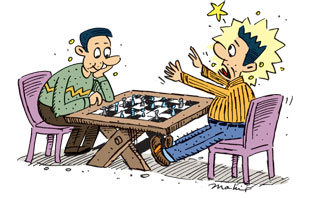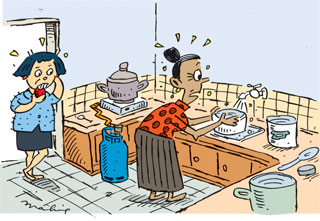|
 by
R. S. Karunaratne by
R. S. Karunaratne
Learn how to use 'never':
'Never' is an adverb that means 'at no time,' or 'in no situation'.
The word can be used in many situations.
'Never' is used to give strong advice or commands.
|

I have never played chess
before. |
Never let children play with firearms.
Get lost and never come back!
Never try to cross my path!
'Never' can be used to talk about present habits and routines.
The rich merchant never gives anything for charity.
The principal is never late.
Mother never forgets to take her umbrella.
Some people never smile.
We never fail to attend church on Sunday.
I never smoke.
'Never' is used for emphasis.
He has never lost an election.
She has never eaten beef. She is a vegetarian.
You will never finish this job in time.
She will never take part in a reality show.
He has never liked cats and dogs.
It never rains, but pours!
|

‘You never ever
help me in cooking,” mother told Jane. |
She never answered my question.
There are certain adverbs used along with 'never'
I have never played chess before.
She will never do that again.
He has never really loved his children.
A. Has he passed any examinations?
B. He has never even sat an exam!
The following words are frequently used with 'never'
Mala never plays any game.
A. Can you lend me Rs. 1000?
B. I am so sorry, I don't have so much of money.
A. Never mind. I'll ask my father. (Don't worry)
I climbed that mountain once. Never again!
(To emphasize that you do not wish to climb the mountain once again.)
'You never ever help me in cooking," mother told Jane. (for emphasis)
Whatever happens Sam never ever complains. (for emphasis)
Never once did he give me a salary increase. (for emphasis)
X will win the election, but you never know. (anything is possible)
The boss may be in a good mood, but you never know. (anything is
possible)
Activity (use 'never' in the right place)
1. Wilson steals anything from anybody.
2. Sagara is at home.
3. My sister has been to India.
4. Pack up your belongings and come back!
5. There is a dull moment in this office.
Key
1 Wilson never steals anything from anybody.
2. Sagara is never at home.
3. My sister has never been to India.
4. Pack up your belongings and never come back!
5. There is never a dull moment in this office.
Rule : Never is used before a verb after a 'be' verb and inbetween
two verbs.
Current English usage
1. He/She dilemma
You can use he as common gender and avoid the rather awkward he/she
construction. The same rule applies when you use his as common gender.
Each student has paid his fees.
This includes both male and female students.
To say, "Each students has paid his or her fees" is cumbersome and
inelegant.
2. Feminine forms
The usual English feminine nouns of certain occupations is formed by
adding '-ess.'
Masculine: host, actor, warder
Feminine: hostess, actress, wardress etc.
The modern tendency is to avoid such feminine constructions, wherever
possible. This is in keeping with the gender equality.
Therefore, director, postmaster, sculptor, instructor and doctor can
be used to talk about both males and female.
If it is really necessary to differentiate, you can say, woman
doctor, woman teacher or woman lawyer.
3. Are you ill or
sick?
Ill means 'unwell.'
I am sorry I couldn't attend your father's funeral. I've been ill.
We do not use 'ill' before a noun. Instead, we can use 'sick.'
He always comes late to school as he is looking after his sick
mother.
In British English we use 'sick' to mean 'bring food up from the
stomach' or 'vomit'. If you feel sick, consult a doctor.
When you're sick you rush to the bathroom.
In American English, however, be sick means 'be ill.'
There are numerous other current expressions in which sick means ill.
Kavindu is on sick leave.
Dimitry has sent a sick note.
He is not entitled to sick pay.
4. Use 'absorb'
correctly.
The word 'absorb' can only be used in the passive voice.
Sanduni is completely absorbed in her work.
Absorbing work is interesting work such as watching a video.
When you say that a sponge is absorbent, you simply mean that it
soaks up water.
5. Adopted or
adoptive ?
Children can be adopted by childless couples.
When they adopt a child, they become adoptive parents.
6. Aim at or aim to
Aim at doing something is preferable although aim to do is found in
many local newspapers.
7. Plane, airplane
and aeroplane
Use aeroplane or plane. Airplane is an American word not accepted in
British English.
Starters
The sentence -
building game
When you add adjectives and adverbs to a sentence, it becomes more
interesting. Here are some helpful hints and steps to follow.
1. You can begin a sentence with a subject that tells what he/she/it
did.
The girls laughed.
'Girls' is the subject and 'laughed' is what they did.
2. Now add an adjective to the subject.
The five girls laughed.
3. Add another adjective to say something more about the five girls.
The five naughty girls laughed.
4. Add an adverb to the verb. How did they laugh?
The five naughty girls laughed hilariously.
5. Add more words that tell when, where or how.
The five naughty girls laughed hilariously during the interval.
(when)
The five naughty girls laughed hilariously in the classroom. (where)
The five naughty girls laughed hilariously. (how)
Activity:
Add suitable adjective and adverbs to the following sentences and
enjoy the fun.
1. The teacher smiled.
Say something about the teacher.
Is he tall, fat, kind, strict or lenient?
How did he smile?
2. The monster growled.
Say something about the monster.
How did he growl?
3. The pipe burst.
What was the pipe carrying?
How did it burst?
4. The players won.
Are they cricket or volleyball players?
Did they win easily?
5. A kangaroo jumped.
Was it a baby kangaroo?(joey)
How did it jump?
6. The telephone rang.
Was it a land or a mobile phone?
Did it ring continuously?
When did it ring?
7. The bottle leaked.
Was it a bottle of water?
When did it leak?
8. The doors slammed.
What kind of doors were they?
How did they slam?
9. The water splashed.
Was it clean or muddy water?
When did it splash?
10. The ship arrived.
Was it a passenger or cargo ship?
When did it arrive? |

